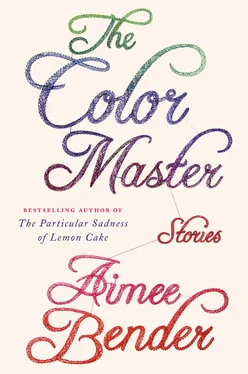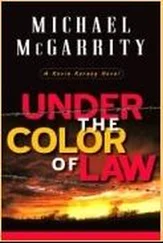She put Hans in a room in the classic situation, in which he had to shock a victim, played by an actor, with a false electrical current, while a pretend supervisor claimed to assume responsibility for the victim’s screams of pain. She employed various friends from graduate school—the Psychology and Theatre Departments—and in truth, it was one of their most fun collaborations, and led to a very vital discussion the following week about grandparents. The test helped explain why cruelty was so easy to indulge if responsibility was claimed by someone else, but, caught off guard, on a regular workday, as his regular self, Hans Hoefler refused to use the shocking equipment, and he walked out, shaking his head, blinking as if he’d been stunned himself. When he returned to the court, pale as ever, the judge hailed his clerk, who called his niece, who drove over right away and ran in with the video to show Hans the recording of his own decency. Of his own interior strength. It was a slow afternoon, and everyone in the court office stood around the TV, watching him watch, hopeful. “You passed!” crowed the clerk.
Hans, as if deaf, made no sound.
“This is good, Hans,” the stout judge said kindly, the judge who, by then, had grown a strong affection for Hans Hoefler; after seeing criminal after criminal denying his crime, screwing up his or her face and saying, It is not me, I would never do such a thing, here was Hans, scooping up what was not his and cradling it like a child. Hans Hoefler, with his heavy sad eyes, who reminded the judge somewhat of his own father, dead the previous year of complications from a liver transplant.
From his viewing seat in the jury box, Hans gripped the wooden pew and said nothing as he watched himself with no expression on his face. They found him a week later, hanging from a rope in his dingy Munich apartment, with a short note propped on the dresser saying he had to die for what he had done to the Jews, to the Gypsies, to the Poles. He had piles of writing on his desk, next to the note, titled, in careful calligraphy: One Nazi’s Confessions . In cramped handwriting, rigid black ink, Hans had written pages upon pages; he had invented instances, written of places and times that did not exist and heinous acts that had never happened. He was a revisionist but backwards, adding horrors instead of denying them, inserting himself wrongly into true events. He used familiar names and terms—Kristallnacht, Dachau, the “sweet smell”—but the details he used otherwise were often shockingly wrong. He wrote of a hurricane at Dachau. He said in Auschwitz the guards were all named Hans, which seemed like a joke, except that all who knew Hans knew his sense of humor was limited. Was he making fun of us? asked the judge, scratching his head. Of history? It’s not funny, he said, and his secretary said no, she didn’t think so, though she could not explain it either. Hans said that he had rounded up Jews and Gypsies in a church and burned them inside and he could not forgive himself for shooting the ones that flew out the window in an attempt to escape. But someone noted that this was awfully close to the plot of the Wiesenthal classic on forgiveness, The Sunflower , and that that Nazi in question was already named. It took ten minutes to find The Sunflower on Hans’s bookshelf, dog-eared to a beige softness.
Hans’s notes were bound and filed in the judge’s paperwork, the finishing chapter of the Hoefler saga, which had been ongoing for more than four years by that point. “Case closed,” said the judge, with no small pang of regret for having asked his niece to do the Milgram study. He had known that Hans would walk out of the test. He’d been sure of it. But if he’d known that, he should have also known that that kind of empirical evidence on videotape might clash too intensely with Hans’s own image of himself as a murderer, which then might unsettle him enough to lead to something worse, but the judge was never a very good chess player and could not think nine steps ahead. It was tiring and difficult, this judge business.
Since Hans had no friends at that stage of his life, his funeral was attended only by the staff of the court. “If only the rest could be so responsible,” said the auburn-haired secretary to the judge’s clerk as they drank cups of stiff coffee afterward, standing in the coatroom, still in their coats. The world, they agreed, needed more Hans Hoeflers. “Better to commit suicide than kill someone else,” they suggested, but the words sat flat in their mouths as they worked that day. Like soda, unfizzed.
Even if it was true, there was something despicable about valuing Hans’s concave heart, and by the end of the day, the judge’s clerk found herself spurning Hans, and flicking him from her mind like a bug.
3.
That auburn-haired secretary did not flick him from her mind; instead, she drew him closer inside it. She became obsessed with what had been wrong with Hans. Why hang himself? Why all the guards named his name? What would cause a person to distort so profoundly? She was about thirty years old, and her life had fallen into predictability, and so these thoughts of Hans would not leave her mind, which was as open as a bowl, ready to receive them.
She dreamed of him all the time, walking through the streets with a cane like her father’s, trailed by a tangle of scruffy dogs. Her father, a man so quiet and unobtrusive he often had been handed people’s plates and trash—even in public, even out dining. There was a generation of German men who, in response to what history had revealed, refused to tolerate any sign of internal aggression. Her father had never raised his voice. He would not even laugh loudly. He said, “I’m sorry,” when people bumped into him on the street, as if his presence on the sidewalk deserved apology, for had he not been there in the first place, he reasoned, the person would have had no one to bump into. “I am a mouse, a mouse,” he had whispered to her as he was dying. The problem was that being a mouse sometimes made people irritable, and many raised their voices in her father’s presence because he spoke so softly it was aggravating. “I CAN’T HEAR YOU!” her mother said, often. “SPEAK LOUDER, MAN!” While he was dying, which took a few days, the nurse kept leaving her mystery novel on his stomach, along with her purse, and sometimes her snack, so when the secretary visited he was covered with objects, breathing thinly and carefully so as not to shake anything off.
Hans joined her father’s ghost-space easily. The two men walked through her dreams together, unable to speak, shoulders folding in, followed by dogs. She couldn’t stop thinking about them. Once, she had yelled at her mother about something small, like clothes, or the telephone, and her father had stumbled in, weeping and whispering, “Stop it!” His exclamation point came in the form of a loud hush , like a radiator expelling heat. She and her mother had looked over, startled. They both liked fighting. It felt like a good workout, somewhat aerobic. German women had a different legacy to manage.
Through leads on her computer and in the phone book, the secretary tried to find living Hoefler relatives, but no one returned her phone calls. Finally, through an advertisement she placed on the Internet, she was able to track down a former girlfriend of Hans’s, from their courtship in the 1950s, when Germany was split in half like a bread roll; when the Ottoman Empire could still occasionally be found on globes in thirdhand trinket shops.
The secretary walked up a dark stairway, curling around to the back of the stone building. The walls smelled of wine, and mold.
“The curious thing about Hans,” said the woman, after introductions had been made and she was now curled on her sofa with bubbly water in a green glass on a coaster of cork, “is that he would not let me perform what many men enjoyed. That is,” she said, petting the long-haired white cat who’d hopped onto her lap, “what men often request. I assume you know what I mean?”
Читать дальше












